| 275
|
CHAPTER 44
Learning New Ways to Work
in the Non-Formal Economy
Work Opportunities for Survival in Hard Times
Every person has a right to contribute to their family, community, and
society as best they can. Human dignity and self-determination come, in
part, from being able to participate in functions that sustain and enhance
life. Life-enabling functions - in addition to acts of love, sharing, art,
and nurturing - also include productive and service-related activities
often referred to as "work." As our profit-hungry global economy
overshadows sustenance based on caring and sharing, more and more aspects
of production and service are performed as jobs for pay. Today's
money-minded value system - "You get what you pay for" - is systematically
marginalizing deeper human values, and the most vulnerable human beings.
Nevertheless, many life-sustaining human activities are still founded
on love and sharing. The majority of productive and service-providing work
is still done without pay, much of it by women and children in the home.
Many disabled people, too, find ways of contributing to the well-being of
family and community that are unpaid, yet life-affirming.
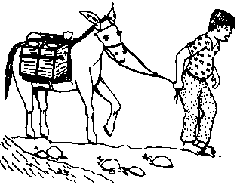
Rural areas. In traditional farming societies,
survival still largely depends on growing and gathering food, hauling
water and firewood, and other physical activities. So physical ability
tends to be highly valued (sometimes more than mental ability). In terms
of fitting into the life and production of the community in rural
areas, a child with a mental disability may be less socially handicapped
than is the child with a physical disability.
GOYO, a boy with Down's syndrome in Ajoya, the village
where PROJIMO is located, regularly went with his father to the fields.
Helping to plant and gather maize (corn) and to cut weeds was
repetitive work the boy could learn and do well. He took pride in helping
his family. During the long dry season when there was no farm work, Goyo
helped to earn a modest income for his family by hauling water from the
river for neighbors, in large tins on a donkey. Other boys disliked this
hard repetitive work, but Goyo did it with pride. Hauling water was his
livelihood until the village modernized and obtained a gasoline pump that
piped water into the homes.
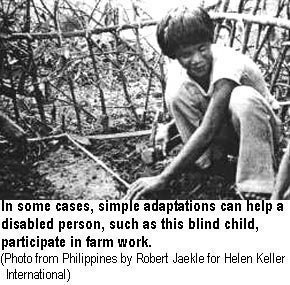
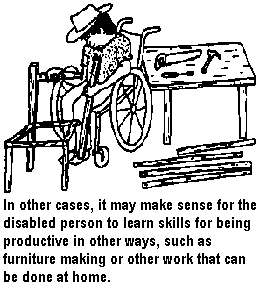
|
| 276
|
| Urban areas. In cities,
successful integration into society often depends more on mental ability
than on physical fitness. Especially for the mentally slow child,
schooling may be a major hurdle. A youth who does not graduate finds it
hard to find a paying job, even doing physical labor. For these reasons,
although in rural areas more concern is often shown for people
with physical disabilities, in urban areas there tend to be more
programs for children who are mentally handicapped. In the
mushrooming cities of the world, unemployment is a growing
problem. Giant industries, in pursuit of "cost effectiveness"
(higher profits), are "down-sizing" (replacing workers with machines).
Today, so many persons are job-hunting that it is often hard for
disabled persons to compete. Since Mexico's entry into the international
free market economy, thousands of small businesses have closed down.
Even university graduates and licensed professionals - doctors, lawyers,
engineers - beg coins on street corners by selling trinkets or by
performing as fire-breathers and clowns.
In today's world of rising joblessness and falling wages, it may be
unrealistic to routinely train disabled people for jobs in the
formal economy. It often makes sense to help them learn skills
within the informal economy: producing things at home or in
neighborhood collectives that they can sell directly on the street or in
a stall at a community market.
Several rehabilitation programs that used to train disabled persons
for skilled factory jobs, such as operators of lathes and heavy
machinery, have changed their approach and now focus on teaching
disabled persons skills that enable them to be self-employed or to work
in small worker-run cooperatives.
Skills Training at PROJIMO
At PROJIMO, disabled persons are able to learn a variety of skills,
mostly in the form of apprenticeships, or learning by doing.
Some of these skills are related to providing health, medical, and
rehabilitation equipment and services to other disabled persons. Other
skills are learned as part of income-generating activities. These skills
range from the production of various articles for sale, to the
management of the village small-goods store, to running a modest welding
service or carpentry repair shop.
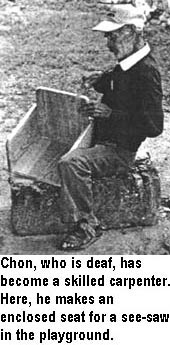
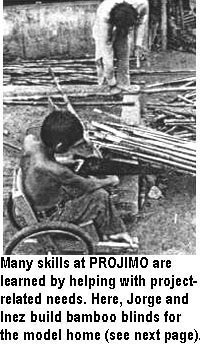
Income-generating activities at PROJIMO mostly
involve the production of low-cost items that can be made with low-cost
tools and equipment. Items include such things as:
 | sandals and shoes, |
 | ornaments for festivals, |
 | woven rugs, |
 | wooden toys and puzzles (see
pages 290-291 and
322), |
 | leather belts with hand-stitched designs, |
 | plastic-woven, metal-frame furniture. |
The production of these items serves three main purposes. 1)
It provides skills training and productive activities for the disabled
people involved. 2) It produces some income for the
program and modest wages for the disabled workers. 3)
It provides disabled persons with work experience, so that when they
return to their homes they can set up a small workshop there and help to
support themselves and their families. |
| 277
|
| Home-making skills.
PROJIMO provides an environment where young people can perform a variety
of home-making skills, ranging from cooking to
house-cleaning to laundry. Because the
disabled participants run the group kitchen, plan meals, and buy the
food, they acquire skills in home economics, learning by doing (and
learning from their mistakes). The Model Home, built
by disabled participants with help from the local community, is a
disability-adapted, low-cost, mud-brick building. It has many features
to help persons with different disabilities be able to keep house more
easily. Disabled persons who live temporarily in the model home while
visiting PROJIMO can try out its different features, and get ideas for
modifying their own houses. Adaptations range from a completely
wheelchair-accessible kitchen, to bedrooms with hand-grips hanging from
the ceilings for getting in and out of bed. Next to the model home is an
outdoor wheelchair-accessible laundry area.
Getting disabled boys and men to help wash dishes and clothes has
been a big challenge, but the adapted facilities make it easier.
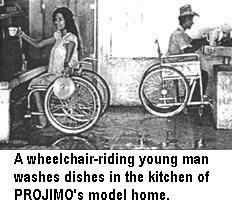
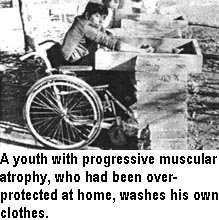
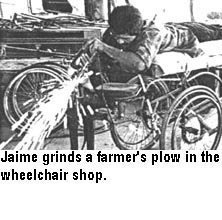
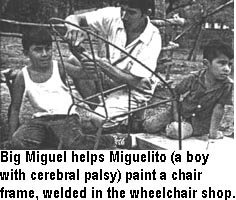
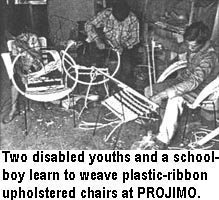
Skills learned in making assistive equipment can be applied to many
kinds of community work. On page 259, we
gave the example of how the wheelchair-making shop turned into a village
repair service where farmers came to repair their broken plows, and
children their busted bicycles. As another income-producing venture, the
workers in the welding shop began to make metal chair frames from metal
building rods (re-bar). Other disabled persons learned to weave the
chairs with plastic ribbon.
These woven chairs sold well in local villages. One boy, Rubén, later
set up his own chair-weaving business at his home, and soon earned twice
as much as his brother in a factory. |
| 278
|
| Disabled people helping one
another provide a lot of the skills-learning at PROJIMO. Some
young persons who first came for their own rehabilitation have stayed on
at PROJIMO to learn the craft, organizational and rehabilitation skills
that most interest them. Several have become very capable
therapy-workers and craftspersons. One example is INEZ,
who first came as an abandoned street child, with one leg paralyzed by
polio. Inez has become a skilled therapy worker, having been taught by
visiting physical therapists.
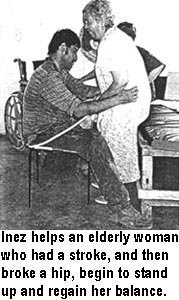
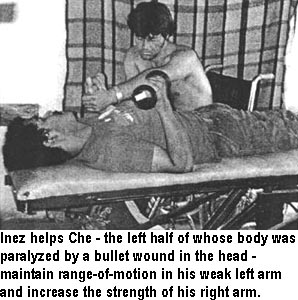 (See story, page 253.)
(See story, page 253.)
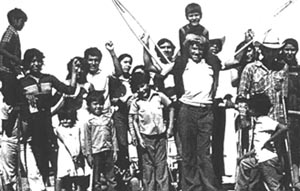
Inez became such a capable therapist and rehabilitation worker that,
after a few years at PROJIMO, he set up his own successful physiotherapy
practice in the city of Mazatlán. In time, however, he gave up the
private practice and returned to PROJIMO. He preferred working as part
of a community-based team to help those with limited resources. Inez
married another PROJIMO worker, Cecilia, and has two energetic
daughters.
With a disabled child on his shoulders, Inez raises his crutches in a
sign of victory. This scene is from a village theater skit to raise
public awareness about the potential of disabled persons. It portrays
Inez's own story: how he first came to PROJIMO as a boy for
rehabilitation, and later became a skilled therapist helping others. |
| 279
|
Carpentry skills.The PROJIMO
wood-working shop is where many disabled youth apprentice in
making all kinds of equipment for disabled children, ranging from
special seating and standing frames to educational toys. With the skills
learned in this shop, some of the disabled young people have gone on to
set up their own carpentry shops. Others have joined rehabilitation
programs where they can put both their carpentry and rehabilitation
skills to good use.
|
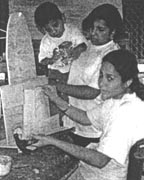
Marielos, who is paraplegic, makes a special standing frame for a
child, who watches with interest from his mothers arms. Marielos
also makes doll-house furniture, for which she has more requests for
sales than she can meet. |
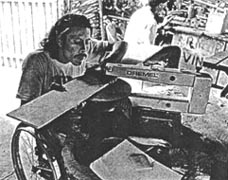
Mario, a street youth who became paraplegic from a bullet wound
in the spine, learned carpentry skills while helping to make special
seating and other equipment at PROJIMO. |
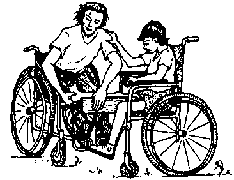
But what makes Mario an outstanding worker is his heartfelt
understanding and concern for the children he works with (see
page 270-271). Here, he adapts a
support for a girl whose leg is casted. |
Even some of the young people who are quadriplegic (with paralysis of
their arms and hands as well as legs) have become skillful carpenters
and toy makers, The first obstacle for them to overcome is their feeling
(and fear) of incapacity. The beauty of PROJIMO is that new-comers have
excellent role models to follow. They dare to try new things and to test
- and stretch - their limits.
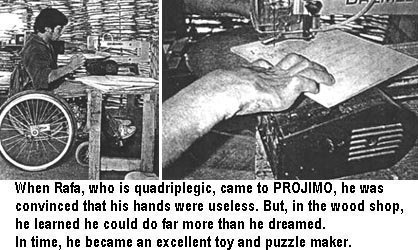
|
| 280
|
|
| Business skills. Several
disabled persons at PROJIMO who collectively run the program have
also learned some organizational skills, and also
book-keeping. Conchita studied accounting before
she became paraplegic. Now she is a coordinator of the program and
manages the financial records. She has taught other workers to help
with accounting and program records. These skills can be useful for
those who later set up their own small workshops or cooperatives.
Video skills. Some work opportunities are
unplanned. The PROJIMO team decided they should make educational
video-tapes of aspects of rehabilitation and therapy where movement
is important, and where words and drawings are not sufficient. So
they raised money to buy a video camera and recruited a skilled
filmmaker to come teach them how to use the equipment, and put
together and edit a film. Mari and Conchita, the two main
coordinators of PROJIMO, mastered these skills. |
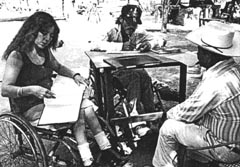 |
| Conchita Lara, with Mario's help, works on the
monthly financial report of PROJIMO. For more about Conchita, see
Chapter 42. |
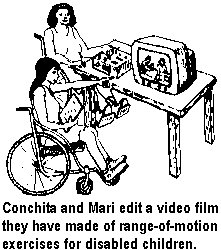 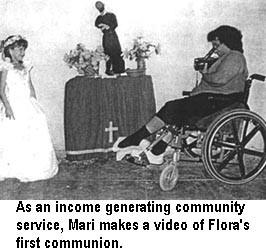
Video cameras and film making was a new and exciting event for the local
villagers. There are 3 or 4 video cassette players in town. Local people
begged to have pictures taken of themselves and their families. Having
acquired the needed skills, Conchita and Mari soon found themselves
invited to take videos of events such as baptisms, weddings, and the
coming-of-age parties of 15-year-old girls.
Making and editing of videos has become one of the more
successful income-generating activities of PROJIMO. |
| 281
|
Maintaining PROJIMO's grounds and buildings.
The maintenance of PROJIMO provides skills training and practice at a
range of tasks useful for maintaining a home or business.
|
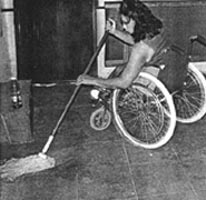
Cecilia, who is now married and runs her own household, helps to
clean up PROJIMO's consultation room. |
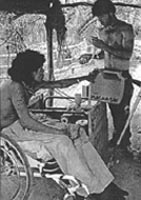
Heliodoro, who is paraplegic, helps Inez repair the project water
pump, and in the process he learns a useful skill. |
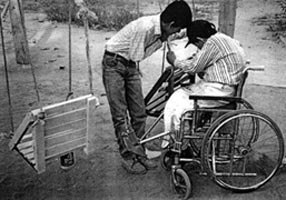
A schoolboy helps Jesús, who is almost blind, to paint the swings
in PROJIMO's Playground for All Children. (See more on Jesús in
Chapters 16 and
45.) |
|
| 282
|
The Spanish Language Training Program run by disabled villagers.
For persons whose disabilities extensively limit the use of their
bodies and hands, finding work opportunities can be quite a challenge.
This is especially true for those who have little or no formal education
- which is often the case.
One skill such persons do have in Mexico is speaking Spanish. So the
PROJIMO team decided to start an intensive Spanish language training
program. For the first classes they invited foreign students who, in
exchange for being taught conversational Spanish, would help teach their
teachers how to teach. PROJIMO especially welcomes language students who
are disabled activists, rehabilitation workers, or progressive health
workers. (If you are interested, send for a brochure. Fees are modest
and help support the program.)
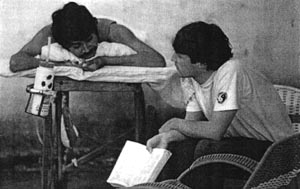
Quique, who was quadriplegic, had almost no control of his hands. He
was one of the teachers in the Intensive Spanish Language Training
Program. Here, he is teaching an idealistic young North American
physiotherapist. He is lying on a wheeled cot, or gurney, to allow the
pressure sores on his backside to heal.
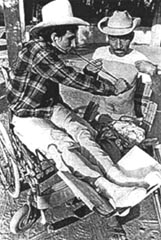
VICTOR, a young doctor, gave PROJIMO one of its
biggest rehabilitation challenges. Soon after graduating from medical
school, Victor broke his neck in a car accident. He spent months in a
hospital, where he developed pressure sores and urinary infections. He
had become suicidal. He was sure he could never work as a doctor.
At PROJIMO, Victor gave the village team a hard time. He did not
believe that a group of uneducated villagers - disabled ones at that -
could do anything for him. But, little by little, his sores healed and
his health improved. He learned to use his hands to grip things by
bending his wrists backwards. In time, he started to provide medical
services to sick villagers. Victor became one of the exceptional doctors
in Mexico who choose to work in a poor and rural community. (In Mexico
City there are over 5000 unemployed doctors who refuse to go to the poor
rural areas where they are needed.) |
| 283
|
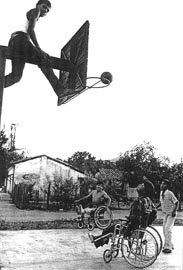
ALL WORK AND NO PLAY MAKES JUÁN A DULL BOY
Note: The different work activities shown in this
chapter represent only a few of many possibilities. We have focused on
some of the more innovative examples, mostly from PROJIMO. Clearly, the
examples shown here only touch the surface of what is possible.
|
| 284
|
A Time for Play and a Time for Work
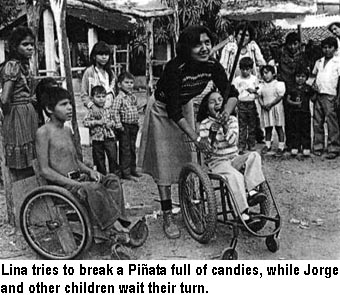
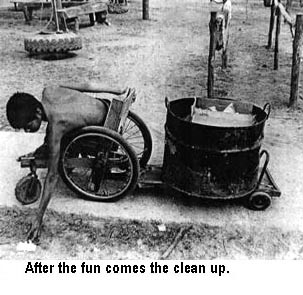
|
|